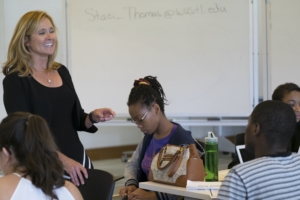WHAT IT TAKES TO GET AN ‘A’
When it comes to grading, The majority of the professors said their students would most likely describe them as “tough, but fair.” Still, they gave insights into what they look for and what it really takes to earn an “A” in one of their classes. From their insights, we compiled this checklist on how to get a top grade:
- Be open to the fact that learning is only productive when it’s difficult
- Forget about regurgitating the material. Instead, become fluent with the language and apply it to real-world situations
- Show that you not only understand the concepts, but also realize when to apply them spontaneously
- Show creativity and individual thought
- Take ownership of your learning
- Think critically and be willing to take risks
- Be open to new ideas about social interaction
- Be willing to fully engage in challenging simulation exercises
- Be receptive to giving and receiving feedback
- Demonstrate excellence
- Show some grit; grit and resourcefulness go a long way
- Work hard and play hard
Warwick Business School’s Peter Corvi gave us his top tips in a “dos and don’ts” format. “Do attend lectures, prepare for and actively participate in weekly seminar classes, contribute to online discussions about ‘hot topics’ in the financial press, and ask questions,” he says. “Don’t leave it until the day before the exam to ask questions. Instead, come to weekly office hours throughout the year.”
WHAT MAKES THEM TICK
Speaking of dos and dont’s, if you don’t want to tick these professors off, here are some of the top things you’ll want to avoid; all things they said they’ve encountered and would consider their least favorable behaviors exhibited by undergraduate students.
- Violating the honor code
- Plagiarizing
- Cheating
- Displaying a negative attitude about class and the subject
- Multitasking during class
- Bullying other students
- Coming to class unprepared
- Squandering potential by disengaging
On the same spectrum, but at the opposite end, are some of the more mind-boggling encounters that top professors say they’ve had with students. Asking to be introduced to someone in the professor’s professional network only to go AWOL when they make it happen? Yes, that really happened. Requesting to move an exam date so you can attend a Yankees game? We’ll just file that one under “You gotta be kidding.”
LESS TRADITIONAL, MORE EXPERIENTIAL
As much as teaching and being a professor is an art, it’s not to say there isn’t some science involved. After all, business school is about learning the technical skills needed for fields such as finance, accounting, marketing, and entrepreneurship.
The top professors on this list are widely known for their award-winning research in the best of academic publications and the pedagogical innovations they are coming up with to enrich the classroom experience. For instance, in a survey that was sent to all 40 of this year’s top professors, many said they wish for business school to be less about lectures and grades and more about applying knowledge in real-world simulations, across disciplines, even in different countries so students obtain a greater global perspective.
Casting aside wishful thinking, these faculty members aren’t letting anything stop them from making it a reality. Instead, professors like Ryan Teeter, Laurence Ales, and Staci Thomas are crafting courses that minimize the traditional and emphasize the experiential.
Teeter, an accounting professor at the Joseph M. Katz Graduate School of Business and College of Business Administration, maintains a belief that students, as future accounting professionals, must be comfortable using technology. He is helping to make accounting undergrads at Pitt Business more marketable by incorporating the use of instructional technology and online learning environments into every aspect of his course design — and through real-world applications such as technological and behavioral challenges of systems implementation and auditor technology adoption in accounting.
Economics professor Ales has transformed the teaching of macroeconomics at Carnegie Mellon’s Tepper School of Business by emphasizing the integration of modeling and data analytics, a departure from textbook instruction in many econ courses. He also uses Twitter to direct macroeconomic news to students and uses it to inspire discussions on theories and models.
Then there’s Thomas, management communication professor at Washington University’s Olin Business School. She is completely turning things upside down with a “flipped classroom” that essentially eliminates lectures and readings from inside the classroom. Instead, in-class time is spent bringing in corporations and nonprofits as clients and allowing undergrads to create business communications solutions for those clients.
I KNOW WHAT YOU DID LAST SUMMER
Finally, in the spirit of getting to know the professors on a more personal level, we bring to you their favorite music, movies, and hobbies in addition to behind-the-scenes details on how they recently spent their summers. Many did research or worked on books and other academic pursuits, but take a closer look at the profiles that follow this story to find out who spent their summer riding a camel and walking on the Great Wall of China, which professor went under the sea for some scuba diving, and which professor spent their off-time engaged in as many physical challenges as possible. Body surfing and ninja courses, anyone?
VISIT THE NEXT PAGE TO SEE THIS YEAR’S LINEUP OF TOP UNDERGRADUATE BUSINESS PROFESSORS














Questions about this article? Email us or leave a comment below.